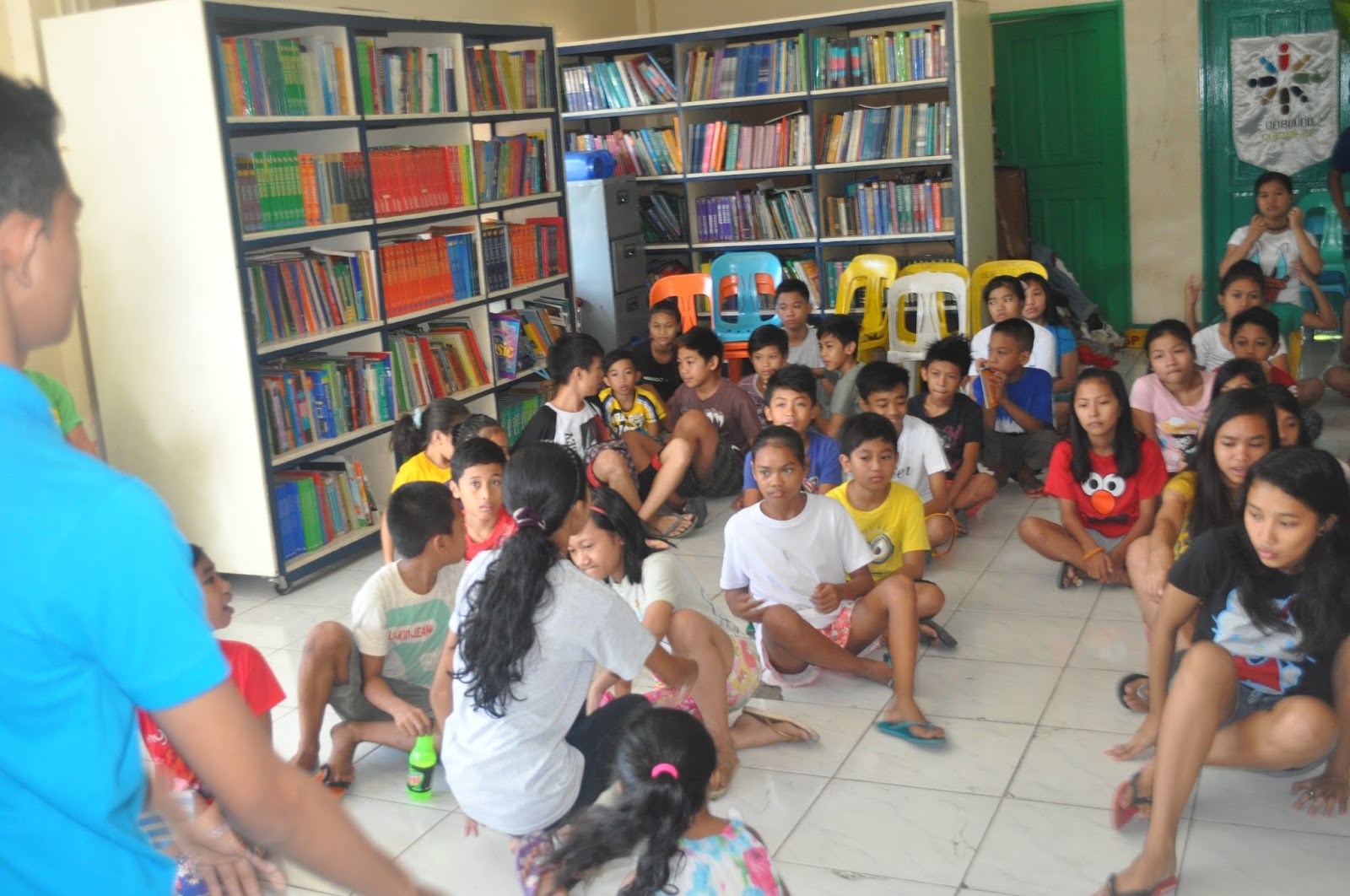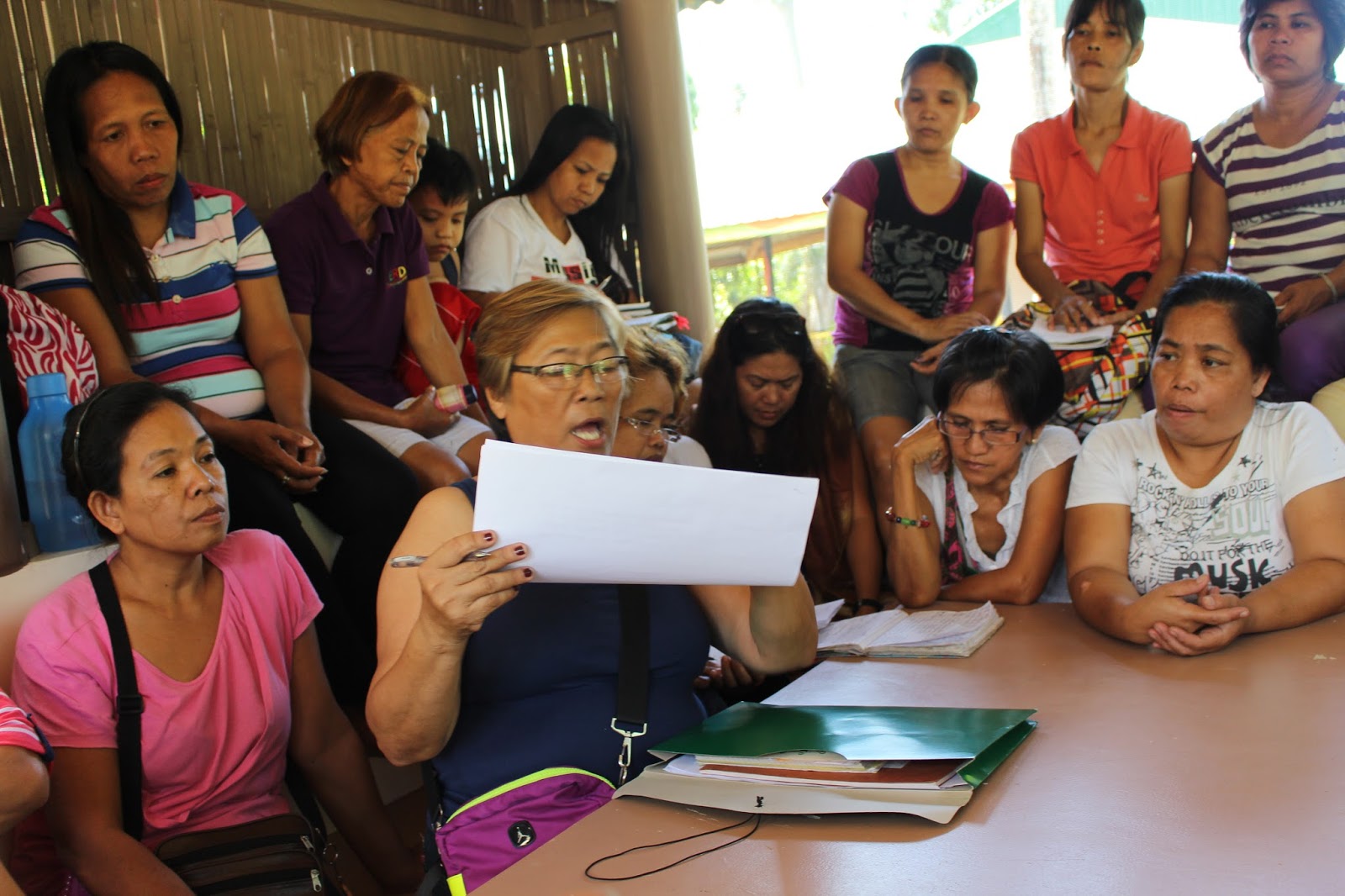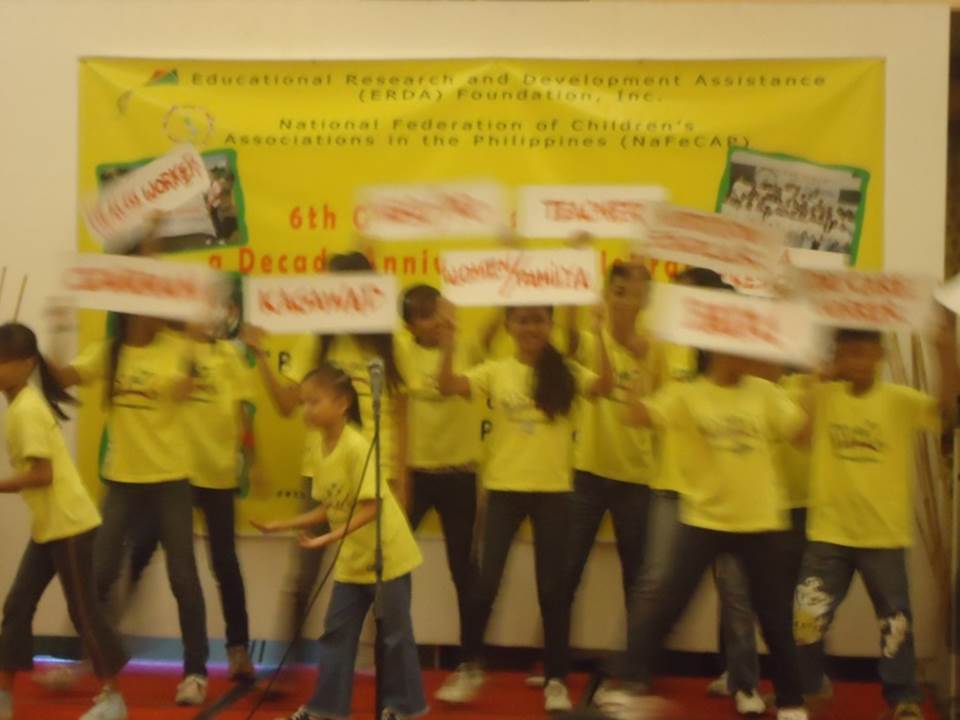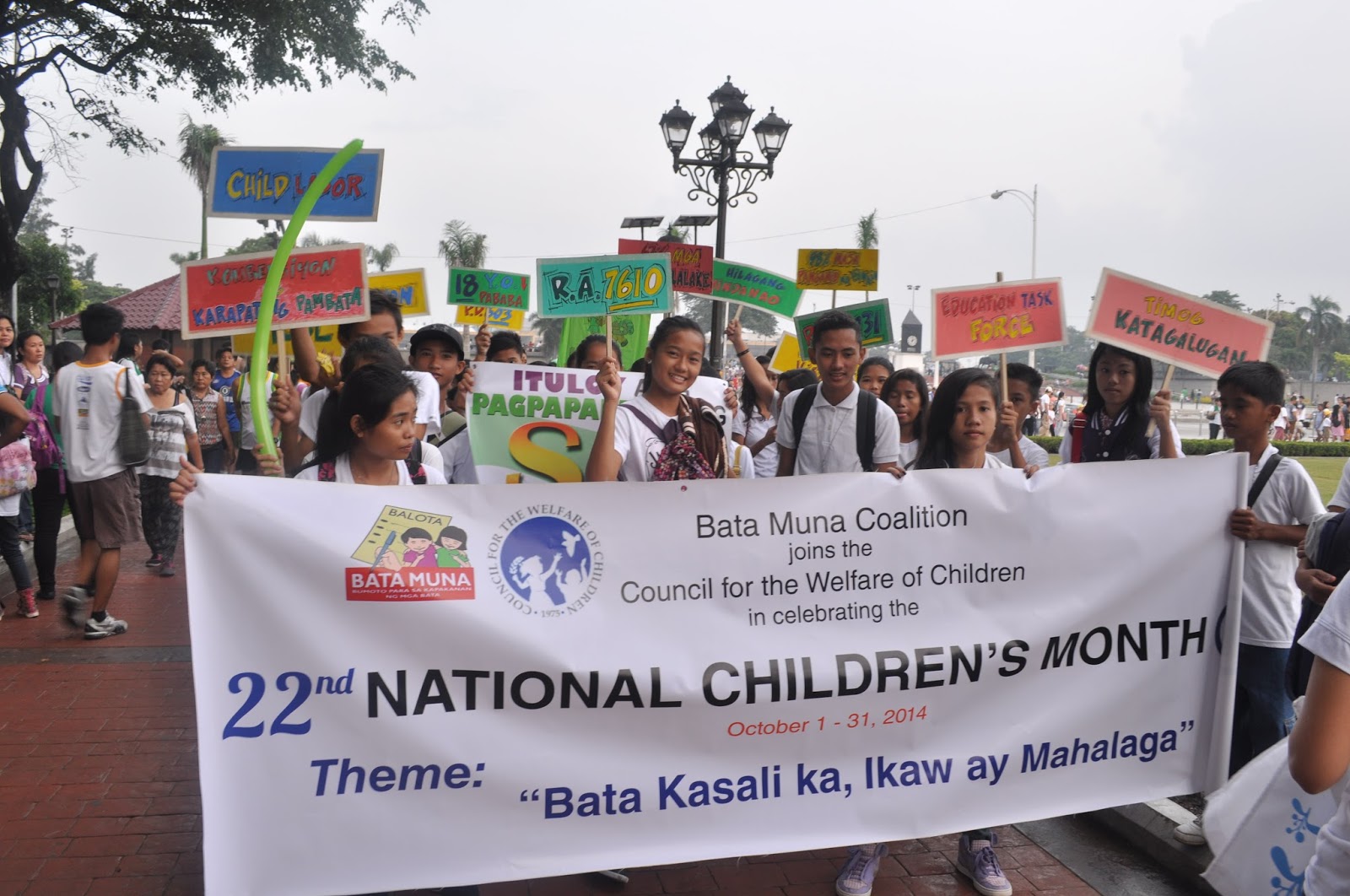Erda Foundation – Education against Poverty in the Philippines
By Denise Nanni
and Milena Rampoldi, ProMosaik. In the following our interview with Edlyn of
the Erda Foundation
in the Philippines, supporting children and helping them to overcome poverty
through education.
and Milena Rampoldi, ProMosaik. In the following our interview with Edlyn of
the Erda Foundation
in the Philippines, supporting children and helping them to overcome poverty
through education.

How was the ERDA foundation founded?
Fr Pierre T. Tritz, SJ founded
ERDA Foundation in 1974. Before this year, he came across a research by the
Department of Education about children who dropped out of school because of
poverty.
ERDA Foundation in 1974. Before this year, he came across a research by the
Department of Education about children who dropped out of school because of
poverty.
He was just walking from his
dormitory in Sampaloc, Manila to the nearby universities (University of the
East and Far Eastern University) where he was teaching Psychology. Through his
travels by foot, he saw, met and talked to at least six children on the street
who were not attending school. He was able to prove that the research was true.
dormitory in Sampaloc, Manila to the nearby universities (University of the
East and Far Eastern University) where he was teaching Psychology. Through his
travels by foot, he saw, met and talked to at least six children on the street
who were not attending school. He was able to prove that the research was true.
Then, he coordinated with a
public school (Juan Luna Elementary School) so that these children could go
back to school. With a handful of his students who volunteered, he set up ERDA
as an Association first. Eventually, ERDA was registered as Educational
Research and Development Assistance (ERDA) Foundation in the Philippine
Securities and Exchange Commission (SEC).
public school (Juan Luna Elementary School) so that these children could go
back to school. With a handful of his students who volunteered, he set up ERDA
as an Association first. Eventually, ERDA was registered as Educational
Research and Development Assistance (ERDA) Foundation in the Philippine
Securities and Exchange Commission (SEC).
Fr Tritz was also a French
National and a Jesuit. He decided to give up his French citizenship and elected
himself to be Filipino citizen in the 1970’s to be able to establish an
organization. (There was Martial Law in the country during that period.)
National and a Jesuit. He decided to give up his French citizenship and elected
himself to be Filipino citizen in the 1970’s to be able to establish an
organization. (There was Martial Law in the country during that period.)
He was 60 years old when he
formed ERDA. Sixty years old has been regarded as the start of the retirement
age in the Philippines. But Fr Tritz was an example that a person could still
do significant things as this age.
formed ERDA. Sixty years old has been regarded as the start of the retirement
age in the Philippines. But Fr Tritz was an example that a person could still
do significant things as this age.

What are the main risk factors in the Philippines
that lead children to drop out from the school?
that lead children to drop out from the school?
According to Ms Dolora H.
Cardeño, ERDA Executive Director, the main reason of children for dropping out
of school has always been poverty.
Cardeño, ERDA Executive Director, the main reason of children for dropping out
of school has always been poverty.
ERDA would also like to share the
socio-economic reasons for children’s dropping out of school: For children, it
would be loss of interest, no food allowance, distance from home to school; for
the family, low family income, lack of support to children’s education, no
other source of income, unskilled parents; for the community, lack of
facilities, no venue for participation and development, no access to social
protection, inactive Barangay (Community) Council for the Protection of
Children.
socio-economic reasons for children’s dropping out of school: For children, it
would be loss of interest, no food allowance, distance from home to school; for
the family, low family income, lack of support to children’s education, no
other source of income, unskilled parents; for the community, lack of
facilities, no venue for participation and development, no access to social
protection, inactive Barangay (Community) Council for the Protection of
Children.

How do you assist their families?
For 42 years, the main program of
ERDA has been on Education. Starting 2017, ERDA would be implementing stronger
Education (Main) and Family and Community (Support) Programs.
ERDA has been on Education. Starting 2017, ERDA would be implementing stronger
Education (Main) and Family and Community (Support) Programs.
For the Education Program, ERDA
has been giving educational supplies (including school bag and uniform) because
these has made the children happy and excited to go to school. But ERDA would
make its Catch-up Program (enrichment sessions) more purposive. The Catch-up
activities will focus on improving the Reading and Math skills of the children.
Based from a study, there is a need to improve these skills in Filipino
children.
has been giving educational supplies (including school bag and uniform) because
these has made the children happy and excited to go to school. But ERDA would
make its Catch-up Program (enrichment sessions) more purposive. The Catch-up
activities will focus on improving the Reading and Math skills of the children.
Based from a study, there is a need to improve these skills in Filipino
children.
For the Family Support, ERDA will
initiate the creation of Community Managed Savings and Credit Associations
(CoMSCAs) of parents. This will teach the parents that “no matter how poor
they are,” they can still save. One CoMSCA is composed of 25 members. They
will have a Committee to preside their meetings and a Constitution (policies)
to follow. They will be encouraged to save an amount that is acceptable to the
group. From their savings, they can have a loan for needs related to their
children’s studies or their family’s basic needs. They will also be encouraged
to save for emergencies which is called Social Fund. Eventually, they will be
able to have savings for individual or group business which is called
Sustainability Fund.
initiate the creation of Community Managed Savings and Credit Associations
(CoMSCAs) of parents. This will teach the parents that “no matter how poor
they are,” they can still save. One CoMSCA is composed of 25 members. They
will have a Committee to preside their meetings and a Constitution (policies)
to follow. They will be encouraged to save an amount that is acceptable to the
group. From their savings, they can have a loan for needs related to their
children’s studies or their family’s basic needs. They will also be encouraged
to save for emergencies which is called Social Fund. Eventually, they will be
able to have savings for individual or group business which is called
Sustainability Fund.
For the Family Support, ERDA will
also coordinate with the Local Government Units (LGUs) for the access of the
family to the health services and other programs of the Philippine Government.
also coordinate with the Local Government Units (LGUs) for the access of the
family to the health services and other programs of the Philippine Government.
For the Community Support, ERDA
will continue to organize children’s associations and parents’ associations.
The children and parents have been ERDA’s partners in advocating for child
rights and welfare (rights of children in child labor, children on the streets,
children who had conflict with the law). Many parents have even been become
volunteers who help in monitoring the children’s education and mobilizing them
for advocacy activities.
will continue to organize children’s associations and parents’ associations.
The children and parents have been ERDA’s partners in advocating for child
rights and welfare (rights of children in child labor, children on the streets,
children who had conflict with the law). Many parents have even been become
volunteers who help in monitoring the children’s education and mobilizing them
for advocacy activities.
ERDA will also continue to
provide capacity-building trainings especially to the Barangay (local
government authority) Council for the Protection of Children (BCPC) in the
different areas where the ERDA Program exist for them to advocate for child
rights and welfare. BCPC is mandated by the Philippine Government to protect
the children and advance their interest. The Barangays are under the Department
of Interior and Local Government.
provide capacity-building trainings especially to the Barangay (local
government authority) Council for the Protection of Children (BCPC) in the
different areas where the ERDA Program exist for them to advocate for child
rights and welfare. BCPC is mandated by the Philippine Government to protect
the children and advance their interest. The Barangays are under the Department
of Interior and Local Government.

What is your program Alternative learning
system about?
system about?
The Alternative Learning
System (ALS) Program of ERDA is based from the Department of Education’s
(Government) ALS. ERDA has an Instructional Manager who facilitates the ALS
Program. This Program is for the children especially youth who have stopped
going to formal school for a long time. ALS is non-formal in approach. ERDA has
a room for the ALS sessions, for example, in the ERDA SaBaNa Center in Tondo.
SaBaNa stands for Sanayan ng mga Batang Nanambakan (Development Center for
Former Child Scavengers).
System (ALS) Program of ERDA is based from the Department of Education’s
(Government) ALS. ERDA has an Instructional Manager who facilitates the ALS
Program. This Program is for the children especially youth who have stopped
going to formal school for a long time. ALS is non-formal in approach. ERDA has
a room for the ALS sessions, for example, in the ERDA SaBaNa Center in Tondo.
SaBaNa stands for Sanayan ng mga Batang Nanambakan (Development Center for
Former Child Scavengers).
From the Department of
Education, the ALS modules are on Communication Skills (listening, speaking,
reading and writing), Problem-Solving and Critical Thinking (numeracy and
scientific thinking), Sustainable Use of Resources/Productivity (ability to
earn a living through self-employment, outside employment, entrepreneurship, sustainable
use of resources and appropriate technology and productivity), Development of
Self and a Sense of Community (self-development, a sense of personal and national
history and identity, cultural pride and recognition, and understanding of
civil and political rights) and Expanding One’s World Vision (knowledge,
respect and appreciation for diversity, peace and non-violent solution of
conflict, and global awareness and solidarity).
Education, the ALS modules are on Communication Skills (listening, speaking,
reading and writing), Problem-Solving and Critical Thinking (numeracy and
scientific thinking), Sustainable Use of Resources/Productivity (ability to
earn a living through self-employment, outside employment, entrepreneurship, sustainable
use of resources and appropriate technology and productivity), Development of
Self and a Sense of Community (self-development, a sense of personal and national
history and identity, cultural pride and recognition, and understanding of
civil and political rights) and Expanding One’s World Vision (knowledge,
respect and appreciation for diversity, peace and non-violent solution of
conflict, and global awareness and solidarity).
After 10 months of ALS
sessions, the ALS students called learners would take the Accreditation and
Equivalency (A and E) Test for Elementary or High School level. If they pass
it, they would receive a Diploma and are qualified to be promoted to the next
Education Level (Junior or Senior High). Ninety-five to 100% of the ALS
learners of ERDA SaBaNa have passed the A and E Test.
sessions, the ALS students called learners would take the Accreditation and
Equivalency (A and E) Test for Elementary or High School level. If they pass
it, they would receive a Diploma and are qualified to be promoted to the next
Education Level (Junior or Senior High). Ninety-five to 100% of the ALS
learners of ERDA SaBaNa have passed the A and E Test.
Before the implementation of
the Kinder to Grade 12 (K to 12) Educational System in the Philippines, ALS
learners who would pass the A and E Test for High School would be qualified to
pursue college education or vocational training, engage in livelihood or look
for work. Because of the K to 12, the ALS learners who would pass the A
and E Test for Junior High School would need to complete the Senior High
School. The K to 12 has Junior and Senior High School levels.
the Kinder to Grade 12 (K to 12) Educational System in the Philippines, ALS
learners who would pass the A and E Test for High School would be qualified to
pursue college education or vocational training, engage in livelihood or look
for work. Because of the K to 12, the ALS learners who would pass the A
and E Test for Junior High School would need to complete the Senior High
School. The K to 12 has Junior and Senior High School levels.

Do you cooperate with local authorities and
institutions? If yes, how?
institutions? If yes, how?
Yes, ERDA partners with local
authorities and government and other non-government institutions. At the local
level, for example, in the ERDA areas, ERDA coordinates with the Barangay
(local government authority). ERDA also applies for accreditation or renews its
accreditation with each partner Barangay. ERDA has also organized capacity-building
trainings for the Barangay Officials specifically to strengthen their Barangay
Council for the Protection for Children (BCPC). ERDA would like to support the
BCPC through these trainings so that they would enact ordinances and implement
programs that would benefit and protect the children.
authorities and government and other non-government institutions. At the local
level, for example, in the ERDA areas, ERDA coordinates with the Barangay
(local government authority). ERDA also applies for accreditation or renews its
accreditation with each partner Barangay. ERDA has also organized capacity-building
trainings for the Barangay Officials specifically to strengthen their Barangay
Council for the Protection for Children (BCPC). ERDA would like to support the
BCPC through these trainings so that they would enact ordinances and implement
programs that would benefit and protect the children.
Photo 1 – Children’s
Association Meeting
Association Meeting
Photo 2 – Parents’
Organization Meeting
Organization Meeting
Photo 3 – Advocacy to
encourage Barangays (local authorities) to Make their Barangay Council for the
Protection of Children (BCPC) Functional
encourage Barangays (local authorities) to Make their Barangay Council for the
Protection of Children (BCPC) Functional
Photo 4 – Junior
Educators also Participating on Advocacy Sessions on Child Rights
Educators also Participating on Advocacy Sessions on Child Rights
Photo 5 – ERDA
Beneficiaries Participating in the National Children’s Month Celebration
Beneficiaries Participating in the National Children’s Month Celebration


